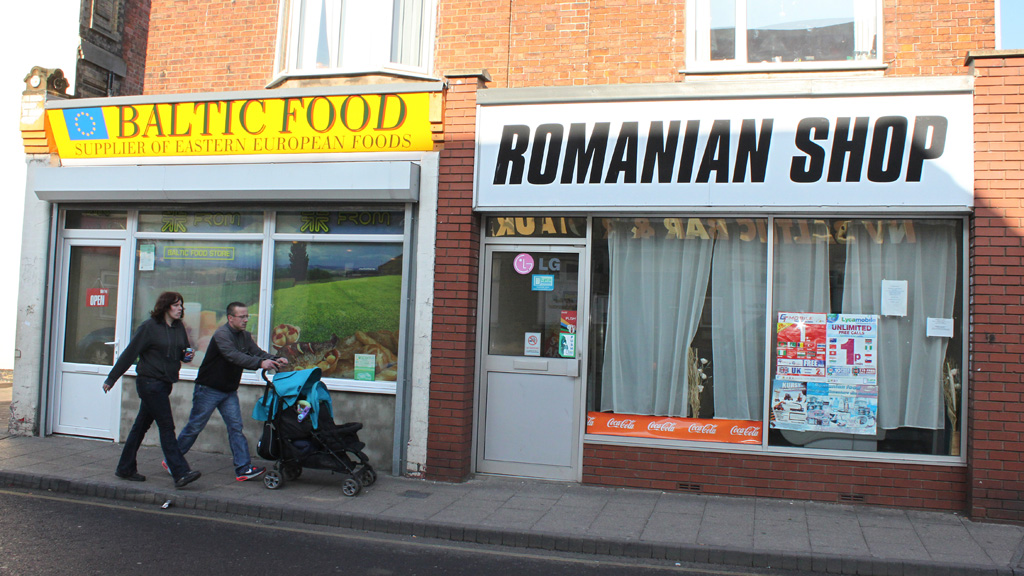New dawn for Romanian and Bulgarian migrants
The end of restrictions on workers from the newest EU countries has been greeted with a slew of negative headlines but little evidence of an immediate surge in new arrivals.
Temporary measures put in place in 2005 designed to limit access to the UK labour market for Bulgarians and Romanians lapsed at midnight.
Critics predict a huge influx of migrant workers, and the government has refused to release estimates of how many people from the two countries are expected to make their way to Britain.
But there was no immediate sign of a wave of new arrivals on Wednesday, with MPs who turned out to greet the first plane arriving from Romania left struggling to find any newcomers to Britain.
Romanians landing at Luton Airport were greeted by home affairs select committee chairman Keith Vaz and committee member Mark Reckless.
The 180-seat aircraft from Tirgu Mures only had 140 passengers on board, Mr Vaz said, and most of the passengers already live and work in the UK.
“Just on the conversations we’ve had with people who have come here, a lot of them are returning people, they already work in Britain and they’re coming back after a holiday so they’re not people coming here for the first time,” he said.
“We’ve seen no evidence of people who have rushed out and bought tickets in order to arrive because it’s the 1st of January. We’d be surprised if they did so, this is after all only a snapshot.”
Most of the Romanians arriving on the 7.40am flight already worked in the UK but Victor Spiresau was coming to the country for the first time.
The 30-year-old who said he earned 10 euros a day working in construction at home said he hoped to make 10 euros an hour in Britain.
He said: “I don’t come to rob your country. I come to work and then go home.
“Here you pay a lot, in Romania it’s very cheap.
“I don’t want to stay here. I want to renovate my home and to make a good life in Romania because it’s much easier to live in Romania because it’s not expensive.”

Britain ‘not top of the list’
Romanian representative Roxana Carare, an Honorary Consul in Britain, said the number of people travelling to the UK today will not change but said there was demand for Romanian and Bulgarian labour across Europe.
She said: “The numbers haven’t changed because people have been able to travel since 2007. But I hear that people are being recruited, so they are coming in response to the demand for work.
“Romanians are being recruited by work agencies from everywhere in Europe, not just UK agencies.”
She told the BBC Britain “is not top of the list” for Romanian migrants because of cultural differences.
“This is Anglo-Saxon country and Romania is a Latin country. People are more likely to go to Italy, Spain and other Latin countries.”
Negative headlines
The Sun reported this week that prospective migrants from Romanian had boasted about planning to beg and steal when they arrived in the UK.
The Daily Mail reported today that hundreds of thousands of migrants from outside the EU could head for the UK after being given passports by the authorities in Bulgaria and Romania.
Other reports have suggested citizens from the two Eastern European countries will attempt to sell their babies when they arrive in Britain.
Think tanks including the National Institute of Economic and Social Research have said that while the numbers of new migrants is unpredictable, the impact on public services is likely to be modest.
The government has introduced new measures barring EU migrants from claiming out-of-work benefits for their first three months in the UK, restricting access to the NHS and threatening to deport those found begging or sleeping rough.
Ninety senior Conservatives attempted to block the end of labour restrictions in a letter to Prime Minister David Cameron, arguing he could invoke a clause in EU law to keep the borders shut. But ministers said the move would not have been legal.
Mr Vaz, the Labour MP for Leicester East, called the moves “panic measures” and said the government should have done more to predict how many migrants are likely to make the journey to Britain.
He said: “There are already 141,000 Romanians and Bulgarians living in the UK.
“The concern of the committee has always been the lack of robust estimates of people coming here and we still feel very strongly the Government ought to have asked the Migration Advisory Committee to have conducted a piece of research which would have told us the number of people who were came into this country or were coming into this country.
“We think that would have been extremely helpful. The fact that we don’t have those estimates means that we have this kind of drama at the end, which is not helpful to anybody.”
A Home Office spokesman said: “This Government has done, and will continue to do, everything possible to ensure people come to the UK for the right reasons – to work hard and contribute to our economy and society.”